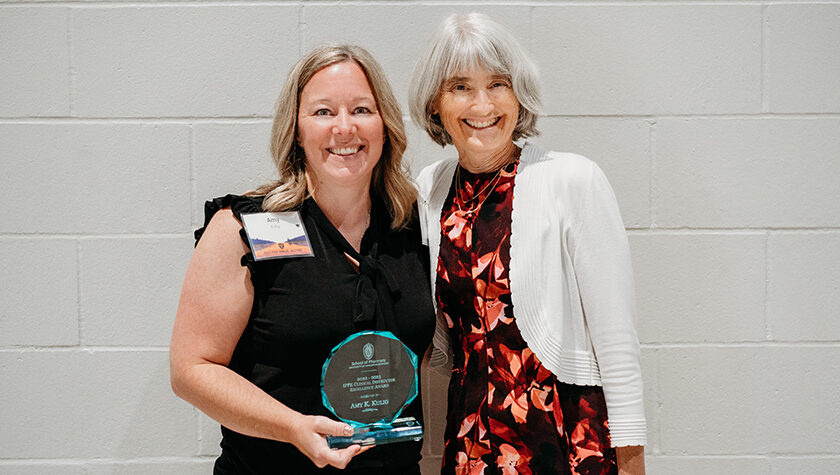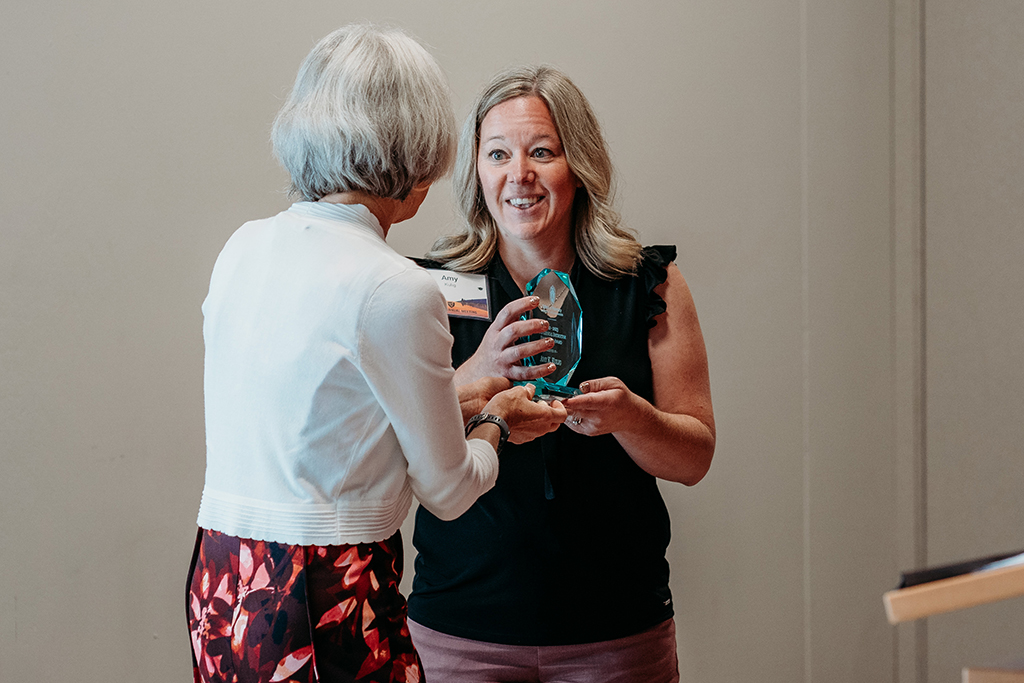
11
September

Kulig (PharmD ’03) is honored for providing excellent mentorship to students at the Froedtert Pharmacy in West Bend Health Center
By Olivia Bouchard
Growing up, Amy Kulig (PharmD ’03) dreamed of becoming an elementary school teacher. Now, as an outpatient pharmacist and pharmacist-in-charge with Froedtert Health in Milwaukee, Wis., she says that dream came to fruition in a different way.
“I am a kind of teacher, but patients are my students, as well as the pharmacy students that I precept,” she says. “I love inspiring people and teaching them and seeing it click for them, whether it’s a patient or a student.”
Kulig has been precepting student pharmacists on their Introductory Pharmacy Practice Experiences (IPPEs) for 20 years, learning over the decades how to best adapt her rotation to be impactful and meaningful for each student.
“My goal as a preceptor is to make sure that students are ready for the real world in pharmacy when they graduate, and I am happy that I have been able to make a difference for some students.”
—Amy Kulig
“The interaction with the students and figuring out what they like, what they know, and where they’re going has been my favorite part of precepting,” she says.
Her approach is working. For 2023, Kulig is being honored with the University of Wisconsin–Madison School of Pharmacy’s student-nominated Clinical Instructor Excellence Award.
“I am honored that the students nominated me for this award,” says Kulig. “My goal as a preceptor is to make sure that students are ready for the real world in pharmacy when they graduate, and I am happy that I have been able to make a difference for some students.”
As a PharmD student at the School, Kulig recalls that some of her most memorable and impactful preceptor experiences were patient-focused. One rotation, with Jeff Fox (BS ’89) at a Walgreens, stands out in her memory as being a non-traditional look at a retail pharmacy role. Another rotation, at an independent pharmacy, showed her the importance of patient relationships.

“Rich Katzenberger (BS ’82) was influential for me — every single person who walked in the door, he greeted them and had conversations with them,” recalls Kulig.
These preceptors continue to inspire her in her own role today. As a pharmacist, Kulig prioritizes her patient interactions, getting to know them whether they come to the pharmacy weekly, monthly, or less frequently. And as a preceptor, she tries to treat student pharmacists the same way, taking the time to get to know the students, their interests, and their future career plans so she can adjust her teaching style and focus to be most beneficial.
For example, recently a student pharmacist came through her rotation who planned to go into industry after graduation.
“It’s been interesting for me to tweak and change my rotation to something that makes sense for individual students,” she says. “There are so many different facets of pharmacy.”
Although the curriculum has changed since Kulig attended the School of Pharmacy — the IPPEs she precepts today didn’t yet exist — her experience as a student continues to shape her career and her interactions with students.
“I am very grateful that I went to UW–Madison,” she says. “I built great relationships, and I continue to build off of that experience every day. I’m always referring back to it, especially when I talk to students.”
Like the preceptors who inspired her nearly two decades ago, Kulig works to instill in her students the idea of showing respect for all people that they interact with.
“Respecting both your patients and your staff helps you provide the best care for everybody who’s around you, because we’re all human and we all have bad days,” she says. “We treat patients as people and not numbers.”






